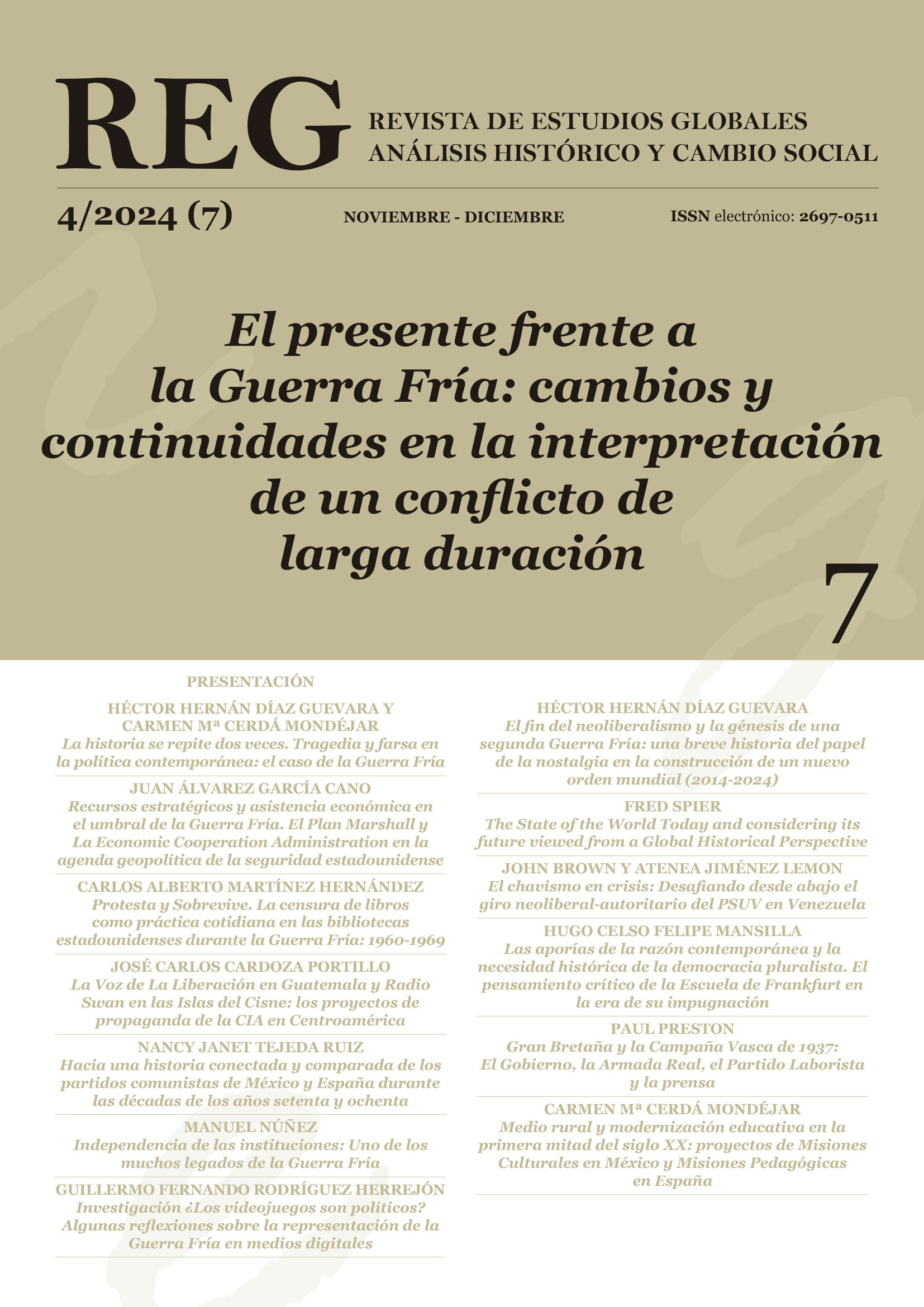Recursos estratégicos y asistencia económica en el umbral de la Guerra Fría
El Plan Marshall y la Economic Cooperation Administration en la agenda geopolítica de la seguridad estadounidense
Resumen
Este trabajo tiene como objetivo dar cuenta de la génesis y desarrollo de una institución como la Economic Cooperation Administration (ECA), misma que fungió como pieza clave en la organización de la asistencia económica estadounidense brindada a Europa a través del Plan Marshall dentro del horizonte histórico del mundo de la segunda posguerra. De manera más específica, se busca mostrar cómo es que dicha institución tuvo una participación clave dentro de la administración estadounidense para cubrir los objetivos del Programa de Almacenamiento de Materiales Estratégicos, considerado como uno de los ejes constitutivos de la agenda geopolítica de la seguridad estadounidense, y que se sitúa dentro de un espacio temporal que puede ser reconocido como el umbral del fenómeno global de la Guerra Fría. En otras palabras, se busca mostrar el papel de la ECA en relación a todas aquellas actividades que permitieron asegurar una gran cantidad de recursos naturales considerados como estratégicos para la producción industrial estadounidense en un contexto de disputa hegemónica como lo fue el de la Guerra Fría.
Descargas
Métricas
-
Resumen623
-
pdf134
Citas
Archivos consultados
U. S. Library of Congress, Washington D. C., Estados Unidos (LOC)
U. S. National Archives, Maryland, Estados Unidos (NA)
Adler-Karlsson, G. (1968). Western Economic Warfare 1947-1967. Estocolmo: Almqvist
& Wiksell.
Affairs, C. o. (1948). United States Foreign Policy for a Post-War Recovery Program.
Hearings before the Committee on Foreign Affairs House of Representatives. Washington
D.C.: Government Printing Office.
Aldcroft, D. H. (1989). Historia de la economía europea. Barcelona: Crítica.
Álvarez García Cano, J. C. (2020). América Latina en la geopolítica de los recursos
estratégicos. Seguridad, guerra y producción industrial bélica en torno al ascenso
hegemónico estadounidense, 1914-1955. Tesis de maestría. México: Universidad Nacional
Autónoma de México.
Arrighi, G., & Silver, B. (2001). Caos y orden en el sistema-mundo moderno. Madrid: Akal.
Benjamin, W. (2017). Guerra a la guerra. En W. Benjamin, La tarea del crítico (págs.
-177). Santiago: Hueders.
Black, M. (2018). The Global Interior. Mineral Frontiers and American Power. Massachusetts:
Harvard University Press.
Block, F. L. (1980). Los orígenes del desorden económico internacional. México: Fondo de
Cultura Económica.
Churchill, W. (2003). Never Give In! The Best of Winston Churchill´s Speeches. Nueva
York: Hyperion.
Comín, F., Hernández, M., & Llopis, E. (2010). Historia económica mundial. Siglos X-XX.
Barcelona: Crítica.
Committe on Public Lands, House of Representatives. (1949). National Minerals Act of
Washington D. C. : Government Printing Office.
Committee on Foreign Affairs. (1949). Extension of European Recovery Program. Washington
D. C. : Government Printing Office.
Committee Study of Export Licensing of Strategic Materials. (1950). Export of Strategic
Materials. Washington D. C.: Government Printing Office.
Cowen, D., & Smith , N. (2009). After Geopolitics? From the Geopolitical Social to
Geoeconomics. Antipode, 22-48.
Cox, R. W. (2013). Fuerrzas sociales, estados y órdenes mundiales: Más allá de la Teoría
de Relaciones Internacionales. Relaciones Internacionales, 129-162.
A. E. (1979). The United States and the Global Struggle for Minerals. Austin: University
of Texas.
Fontana, J. (2018). El siglo de la revolución. Una historia del mundo desde 1914. México:
Crítica.
Gramsci, A. (2000). Cuaderno 22. Americanismo y fordismo . México: ERA.
Herrera, D. (2020). La geopolítica y la crítica. Lo político y lo geopolítico. En D. Herrera,
Geopolítica. Espacio, poder y resistencias en el siglo XXI (págs. 9-42). México: Trama-
FFyL-UNAM.
House of Representatives. (1949). National Minerals Act of 1949. Hearings before a Subcommittee
on Mines and Mining of the Committee on Public Lands. Washington D.C.:
Government Printing Office.
Huberman, L., & Sweezy, P. (1973). Teoría de la Política Exterior Norteamericana. Buenis
Aires: Merayo Editor.
Industrial Movilization of War. History of the War Production Board and Predecesor Agencies
-1945 (Vol. 1). (1947). Washington D.C.: United States Government Printing Office.
Intelligence Division, GSUSA Department of The Army. (1947). Strategic and Critical
Minerlas of The United States Vol. I, World Areas Essential to the United States Industry.
Washington D. C.: Intelligence Division, GSUSA Department of The Army.
Joint Committee on Foreign Economic Cooperation. (1949). ECA and Strategic Materials.
Washington D. C.: Government Printing Office.
Judt, T. (2016). Postguerra. Una historia de Europa desde 1945. Barcelonma: Taurus.
Juste, A. M. (2010). Proyecto europeo, espacio público e historia de la integración
europea: notas para un debate. Ayer, 21-54.
Kennan, G. F. (1998). Al final de un siglo. Reflexiones, 1982-1995. México : Fondo de
Cultura Económica.
Keynes, J. M. (2002). Las consecuencias económicas de la paz. Barcelona: Crítica.
Kimdleberger, C. P. (2011). Historia financiera de Europa. Barcelona: Crítica.
Koselleck, R. (2023). Tras la línea mortal. La era de lo total. Conceptos históricos, 8(13),
-177.
Krug, J. A. (1947). National Resources and Foreign Aid. Washington D.C.: Department
of the Interior.
Lowe, K. (2016). Continente salvaje. Europa después de la Segunda Guerra Mundial. . Barcelona:
Galaxia Gutenberg.
Magdoff, H. (Septiembre de 1967). Aspectos económicos del imperialismo. Pensamiento
crítico(8), 15-46.
Marichal, C. (2010). Nueva historia de las grandes crisis financieras. Una perspectiva global,
-2008. Buenos Aires: Debate.
Michelena, J. A. (1985). Política y bloques de poder. Crisis en el sistema mundial. México:
Siglo XXI.
Office of the Federal Reguster National Archives and Records Service General Services
Administration. (1962). Public Papers of the Presidents of the United States Harry S.
Truman. Washington D.C.: United States Government Printing Office.
Oster, H. E. (1957). Historia económica de la Europa moderna. México: Fondo de Cultura
Económica.
Polanyi, K. (2021). La gran transformación. Los orígenes políticos y económicos de nuestro
tiempo. México: Fondo de Cultura Económica.
Price, H. B. (1955). The Marshall Plan & Its Meaning. Nueva York: Cornell University
Press.
Romano, S. (2013). ¿América para los americanos? Integración regional, dependencia y
militarización. Panamá: Ruth Casa editorial.
Rosenzweig, F. (2015). Escritos sobre la guerra. Salamanca: Sígueme.
Simon, H. A. (1953). Birth of an Organization: The Economic Cooperation Administration.
Public Administration Review, 13(4), 227-236.
Snyder, G. H. (1966). Stockpiling Strategic Materials. Politics and National Defense. San
Francisco: Chandler Publishing Company.
Special Subcommittee on Public Lands, House of Representatives. (1951). Mine Access
Road within the National Forests. Washington D. C.: Government Printing Office.
Spykman, N. J. (1944). Estados Unidos frente al mundo. México: Fondo de Cultura
Económica.
State, D. o. (20 de Octubre de 1947). General Records of the Department of State.
Trade Ageements Branch Subject File Relating to International Commodity Problems,
-1950, Box No. 2. Economic Relations with the U.S.S.R. and its Satellites. U.S.
National Archives.
State, D. o. (18 de Noviembre de 1947). General Records of the Department of State.
Trade Agreements Branch Subject File Relating to International Commodity Problems,
-1950. Memorandum of Conversation. U.S. National Archives.
State, D. o. (26 de Julio de 1948). General Records of the Department of State. Trade
Ageements Branch Subject File Relating to International Commodity Problems, 1946-
, Box No. 2. Additional Recommendations with Respect to Twenty Two Items Needed to
Stockpilling. U.S. National Archives.
State, D. o. (1949). General Records of the Department of State. Trade Agreements Division
Subject File Relating to International Commodity Problems, 1946-1950. U.S. National
Archives.
Tarnoff, C. (1991). The Marshall Plan: Design, Accomplishments, and Relevance to the
Present. Washington D.C.: Congressional Research Service, The Library of Congress.
(1947). The Impact of Foreign Aid upon the Domestic Economy: A Report to the President by
the Council of Economic Advisors. Washington D.C.
The Regional Oral History Office. (1990). Evan Just, «Geologist»: Engineering And Mining
Journal, Marshall Plan, Cyprus Mines Corporation, and Stanford University, 1922-
Berkeley: University of California.
Truman, H. S. (12 de Marzo de 1947). President Truman´s Message to Congress. Document
; 80th Congress, 1st Session; Records of the United States House of Representatives.
National Archives.
United States Department of Interior. (1947). Minerals Yearbook 1945. Washington
D.C.: Government Printing Office.
United States Department of the Interior. (1948). Minerals Yearbook 1946. Washington
D.C.: Government Printing Office.
Westad, O. (2018). La Guerra Fría. Una historia mundial. Barcelona: Galaxia Gutenberg.
Wolfgang Benz, H. G. (1986). Europa después de la Segunda Guerra Mundial (Vol. 1).
México: Siglo XXI.
Derechos de autor 2025 Revista de Estudios Globales. Análisis Histórico y Cambio Social

Esta obra está bajo una licencia internacional Creative Commons Atribución-NoComercial-SinDerivadas 4.0.










